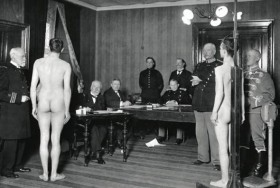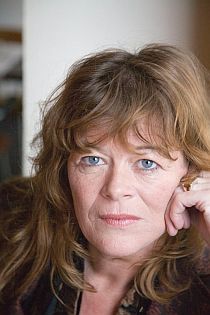


Mark Soosaar: Vabatahtlikud (Volunteers)
I Danmarks Radios arkiv ligger en kopi af en dokumentarfilm fra 1919 med titlen ”Danish Volunteers” (betegnet ”Korps Westenholtz”), som Anton Kjædegård i 1972 opsporede hos et filmselskab i Ontario. Filmen er optaget af den danske fotograf Asbjørn Beck, der fulgte Kompagni Borgelin, et dansk frikorps, privat hær eller milits (knyttet til Korps Westenholtz, men nyere og under eget navn, Dansk-Baltisk Auxiliær Corps) på omkring 200 unge mænd, som under Richard Gustav Borgelins ledelse deltog på estisk side i kampene mod indtrængende russiske styrker under den estiske uafhængighedskrig 1918-20. Betydelige dele af denne film, altså Becks reportage fra fronten og fra bag fronten indgår i Mark Soosaars omhyggelige, speakbårne, roligt ordnede skildring af danske, svenske og finske frivilliges deltagelse i kampene og medvirken – måske lille af militært omfang, men betydelig som moralsk og politisk støtte – til den estiske uafhængighed og til oprettelsen af den estiske republik 2. februar 1920.
Filmen består af en række nye interviews med erindringer og kommentarer og af et sjældent arkivmateriale af film, stills, dagbøger og breve, et historisk tilbageblik, som nu i 2014 med ét kan siges at være alvorligt aktuelt: frivilliges deltagelse i militære konflikter i andre lande på politiske, religiøse og etiske grænsekrydsende grundlag.
Den koncentrerer sig i tre klare afsnit om tre nationaliteters frivillige, danske, svenske og finske unge nationaltsindede antikommunister og bygges der op om tre hovedpersoner, den danske kompagnichef Richard Borgelin, den svenske luftkaptajn Einar Lundborg og den finske kvinde Aino Mälkonen, som under mandsnavnet Aimo og i en mands uniform deltog i kampene. Afsnittene føjes i en afdæmpet, vemodig stemning sammen af et digt, som blev fundet i lommen på den danske frivillige Søren Richard Opffer, der faldt i kampene ved Ostrow 27. juli 1919 (FOTO). Digtet indgår i forskellig national musikalsk form i de tre afsnit, men på den samme visemelodi, man synes, man kender.
En enkelt overlevende nåede under filmens tilblivelse at give sit vidnesbyrd i filmen. Centralt placeret er der en samtale med Johannes Tark (1900-2004). I det han fortæller om krigen, knytter han uden at tænke over det, en kommentar til opfattelsen af fjenden. Alle andre steder i filmen omtales fjenden som bolsjevikkerne eller kommunisterne. Tark siger konsekvent russerne. Det er en tankevækkende detalje.
Estland 2006, 35 min. Weiko Saawa Film, Pärnu og Vesterholt Film og TV, København.

SYNOPSIS
Estonia became a sovereign nation after its War of Independence (1918- 1920), a war fought against Communist Russia to the east and forces loyal to Germany to the south. Military reinforcements for Estonia came from White Russians, Latvia and the UK. But lesser known is the aid of volunteer soldiers from Finland, Sweden and Denmark who joined Estonians in their fight and “Vabatahtlikud” focuses on this latter group. Among the heroes is Aino Mälkonen, a Finn who changes her name, cuts off her hair and joins the Estonian frontlines in battle in a man’s uniform.
Eesti Vabadussõja veteranid on nüüdseks kõik hinge heitnud kuid kajama jääb sõjaaegne keerukus ja segadus kus naaberriigid hästi tajusid kui habras on nende ende suveräänsus: kui Eesti langeb, võivad ka nemad kommunismi küüsi langeda. Film “Vabatahtlikud” käsitleb just neid Soomlasi, Rootslasi ja Taanlasi kes tulid Eestile appi. Kangelaste hulka kuulub ka Aino Mälkonen kes oma soo tõttu tõrjutakse Soome sõja rindelt, kuid kes võltsib oma eesnime passis meheks “Aimo”, ajab juuksed maha ja tõttab rindele, Eestimaale appi. (Languages: Estonian, no subtitles / English, voice over and subtitles)
http://www.mona.ee/eesti/ev96.htm (fra en Mark Soosaar retrospektiv serie på museet i Pärnu. Mark Soosaar står også bag Pärnu International Documentary and Anthropology Film Festival)
